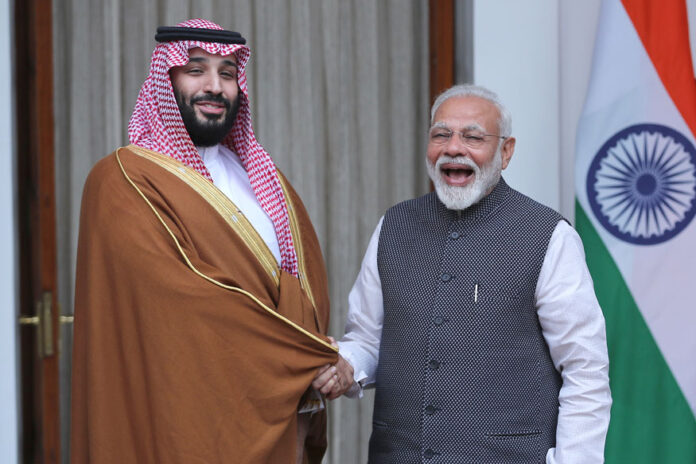India’s relations with the Gulf Cooperation Council (GCC) countries, especially Saudi Arabia and the United Arab Emirates (UAE), have witnessed a significant upswing since 2015, across the areas of trade, investments, counter-terrorism and security cooperation. Regional and international developments, including the rise of Islamic State (ISIS), China’s growing regional footprint, as well as heightened tensions over Iran’s nuclear program, also contributed to amplifying the importance of the GCC states in India’s foreign policy calculus.
By Md. Muddassir Quamar
The growing ties, however, had to endure the impact of the COVID-19 pandemic. All aspects of bilateral relations, including trade, investments, flow of workers and pilgrims, and above all, physical high-level political contacts, were seriously curtailed. Nonetheless, New Delhi kept the diplomatic channels with the GCC countries open, with Prime Minister Narendra Modi holding several telephonic conversations with the Gulf leaders. India and the GCC countries exchanged medical supplies and personnel to help each other fight the pandemic. With the world gradually getting back to normalcy and economic and trade activities regaining strength, India-GCC relations too are expected to attain the vibrancy of pre-COVID days.
The Brief maps the disruptions caused by COVID-19 in India’s relations with the GCC countries and underlines the efforts undertaken to help rejuvenate bilateral ties. It further highlights the issues that continue to pose a challenge and suggests policy initiatives in new areas that can supplement the efforts currently underway.
Economic impact
Globally, COVID-19 negatively impacted both the flow of people and trade. The World Health Organization (WHO) declared COVID-19 a global pandemic on March 11, 20201 and by the end of the month, India as well as GCC countries had decided to suspend all international flights. Country-wide or limited lockdowns were also imposed simultaneously. Expatriate Indian workers were seriously affected by these measures.
Due to the curtailed economic activity, India-GCC bilateral trade was seriously affected. As noted in Table 1, the total trade between India and GCC during April and October 2020, was $39.98 billion, with the share of GCC in India’s foreign trade during the period being 12 per cent. During the same period in 2019-20, the share of India-GCC trade was about 33 per cent of India’s total foreign trade. Petroleum imports, the most important commodity in the bilateral trade, were also seriously affected. India’s oil imports from the GCC between April and October 2020 was worth $17.5 billion, 37.65 per cent of India’s total. In 2019-20, India had imported $55.61 billion worth of petroleum from the GCC.
The worst affected due to the lockdowns and economic disruptions were the over nine million strong Indian expatriate community in the GCC countries. A section of workers lost their jobs while some were stranded in crowded and unhygienic labor camps without social distancing and with limited resources. In April, over 2,000 Indians in the GCC countries tested positive for the virus. A plea was filed in the Supreme Court of India for rescue of the Indian workers stranded in the Gulf. The Indian Embassies and Consulates in the GCC were flooded with requests from stranded workers for help on social media platforms. While the local community welfare organisations were mobilised to provide help, serious challenges confronted the Indian community.
Eventually, on May 7, 2020, the Government of India launched the Vande Bharat Mission to rescue and repatriate stranded Indian workers with the active support of the respective governments in the GCC countries. As of September 16, 2020, 1,447,481 Indians stranded abroad were repatriated through the air, sea and land routes. Unsurprisingly, the GCC contributed the significant majority of those repatriated from abroad, at 927,212, comprising nearly two-thirds of the total or nearly 10 per cent of Indian expatriate population in the GCC countries. While these figures were valid for the sixth phase of the Vande Bharat Mission in September, three more phases of the mission were completed till December 2020.
The return migration of the Indian expatriates is likely to have a serious short-to-medium term impact on the livelihood of all the Gulf returnees and their families. It will cause a substantial drop in the remittances India receives from the GCC that make up nearly 50 per cent to the total remittances into India. These remittances contribute nearly 3 per cent to India’s GDP. Together with the impact of the pandemic, the local labor market policies to promote nationalisation of jobs have also adversely affected the Indian expatriates.
High-level diplomatic contacts
During the pandemic, there was an increased use of technology to maintain high-level political contacts. Video conferencing and telephone conversations, along with the exchange of medical and pharmaceutical equipment and personnel, gave rise to new terms such as ‘virtual diplomacy’ and ‘COVID diplomacy’. Prime Minister Modi held telephonic conversations with GCC leaders on several occasions.
On March 17, 2020, in his conversation with Crown Prince Mohammed bin Salman of Saudi Arabia, Modi urged the G-20 (with Riyadh being the current Chair of the group) to take a leadership role in the fight against the pandemic. On March 26, the prime minister held conversations with Abu Dhabi’s Crown Prince, Mohammed bin Zayed and Qatari Emir, Tamim bin Hamad Al-Thani. On April 1, Modi held talks with Kuwaiti Prime Minister Sabah Al-Khaled Al-Sabah.
On April 6, 2020, the prime minister talked to King Hamad bin Isa Al-Khalifa of Bahrain, and discussed the health crisis and consequences of COVID-19, “including on logistics chains and financial markets.” The issue of welfare of Indian workers was raised and the King assured the prime minister of their welfare. On April 7, the prime minister talked to Sultan Haitham bin Tariq of Oman, and the two leaders “discussed the health and economic challenges” posed by COVID-19.
As part of the ‘Covid diplomacy’, medical support and aid was exchanged. At the request of the Kuwaiti government, on April 11, an Indian rapid response team comprising 15 doctors and health professionals was sent to Kuwait. On April 19, India dispatched a shipment of 5.5 million hydroxychloroquine pills to the UAE. On May 2, India received 7 metric tons of medical supplies from the UAE. India also sent a team of 88 medical professionals to the UAE.
As the situation started to get a sense of normalcy, New Delhi began taking concentrated steps to re-engage the GCC countries, External Affairs Minister (EAM) Dr. S. Jaishankar and Minister of State (MoS) for External Affairs, V. Muraleedharan, paid back-to-back visits to the region. On November 24-25, the EAM undertook a two-day visit of Bahrain, wherein he met with the Bahraini leadership, including Crown Prince Salman bin Hamad Al-Khalifa and conveyed condolences on the demise of Bahraini Prime Minister, Khalifa bin Salman Al-Khalifa, earlier that month.
Dr. Jaishankar held wide-ranging discussions with his Bahraini counterpart Dr. Abdullatif bin Rashid Al-Zayani and the two leaders agreed to “further strengthen the historic India-Bahrain ties including in areas of defence and maritime security, space technology, trade and investment, infrastructure, IT, FinTech, health, hydrocarbon and renewable energy.” Dr. Jaishankar invited Dr. Al-Zayani to visit New Delhi to participate in the third India-Bahrain High Joint Commission meeting.
During the same tour, he visited the UAE on November 25-26. He called on Abu Dhabi’s Crown Prince Mohammed bin Zayed and held discussions with his counterpart Abdullah bin Zayed. COVID-19 and its impacts on the healthcare and economy formed the bulk of the discussions and the two sides “reviewed their cooperation on various facets of their comprehensive strategic partnership including trade, investment, infrastructure, energy, food security and defence.” Regional and international developments also came up for discussion and both agreed to continue coordination on issues of mutual interest.
On December 26-27, the EAM travelled to Qatar. Dr. Jaishankar called on Qatari leaders including Father Emir Hamad Al-Thani and Emir Tamim and thanked the Qatari leadership for taking care of the Indian community during the pandemic. He also met Prime Minister and Interior Minister Khalid bin Khalifa Al-Thani, and held wide-ranging talks with his counterpart Mohammed bin Abdulrahman Al-Thani, wherein both sides agreed to “strengthen the multifaceted bilateral relationship in areas such as energy, trade, investment, food processing, healthcare, education, culture, defence and security.”
MoS Muraleedharan visited Oman on December 16-17 and met the foreign and labor ministers of the Sultanate. Issues related to COVID-19 and its impact on the economy and Indian concerns regarding its citizens working in Oman were discussed. The visit built on the discussions held between Prime Minister Modi and Sultan Haitham in April, the virtual Joint Commission Meeting held in October and the virtual meeting between the EAM and Omani Foreign Minister, on December 2.
New possibilities
The pandemic has brought to fore new possibilities for cooperation between India and the GCC countries. Firstly, there is immense scope for investments in the healthcare and the pharmaceutical industries. India is already a popular regional destination for medical tourism. Digital healthcare services are an area that are likely to witness immense growth in the near future. The demand for hygiene and personal protective equipment (PPE) products has already skyrocketed. India has emerged as a major manufacturing hub for these products, apart from its strengths as a pharmaceutical manufacturing hub. There are immense possibilities to attract investments from the GCC countries in these emerging sectors. It fits well into Government of India’s initiative to develop the industrial and manufacturing base in India under the Atmanirbhar Bharat program. There are also possibilities to attract investments in the Ayurveda healthcare ventures which has a growing market in the Gulf region.
Secondly, higher education is an area that remains under-exploited, despite the potential for enhanced cooperation. Given that the Indian ‘Institutions of Eminence’ have now been given the green signal to set up branches outside India, IITs and IIMs should look for possibilities for opening branches in the GCC countries which will attract both the local and expatriate population. India should also make concentrated efforts to attract students from Gulf countries to join its higher educational institutions for professional courses. India already attracts a large number of students from its immediate neighborhood and in th recent years, students from GCC countries have begun to look for international destinations such as the US, Europe, Australia, China and Japan to gain professional education. The vast network of professional colleges and universities in India can be an attractive destination for GCC students. The field of digital education services can also be an area to attract GCC investments and strengthen bilateral cooperation.
Thirdly, there are immense possibilities for cooperation in the field of defense manufacturing. India and the GCC countries have witnessed an extraordinary growth in bilateral defense relations under Prime Minister Modi. The Government of India has in May 2020 increased the limit for FDI in defense manufacturing industry from 49 per cent to 74 per cent through direct route, while 100 per cent FDI is possible through government route. This can be a major area to attract investments, especially as the GCC countries are among the world’s top defense importers. There is also a possibility of a multilateral cooperation among India, the UAE and Israel, given that India already has strong bilateral cooperation with both these countries in the defense and security fields.
Finally, niche areas such as space exploration, artificial intelligence, cyber security, bioinformatics, renewable energy etc. can be the new areas for cooperation between India and GCC countries. The UAE is fast emerging as a space exploration leader in the Arab world. The GCC countries, including the UAE and Saudi Arabia, have in recent years invested significantly in the renewable energy sector. India, being an energy-deficient country with a walloping hunger for energy, should explore possibilities for enhancing cooperation in this sector.
Conclusion
The COVID-19 pandemic has impacted bilateral ties between India and GCC countries in a significant manner. While trade relations and Indian expatriates were negatively impacted, the flow of investments from GCC to India witnessed an upswing. The cooperation and coordination in the fight against the pandemic was an important positive underlining the strong bilateral bonds. A continuity in terms of political and diplomatic contacts through digital meetings, telephonic conversations and virtual diplomacy, was notable. In the last two months of 2020, India undertook concentrated efforts to rejuvenate its relations with GCC countries. It is now time for India and GCC to start looking beyond the pandemic to develop cooperation in new and emerging areas, identified above, and tap the infinite potentials for further strengthening the bilateral relations.
This article first appeared in www.idsa.in and it belongs to them. The author is a research associate with IDSA.








